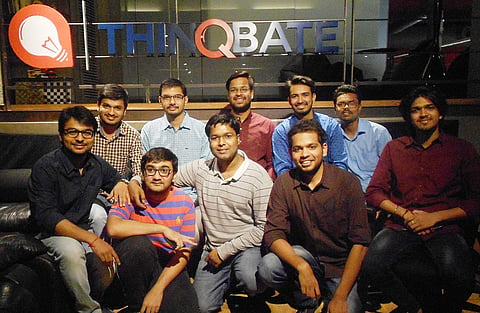

Back in 2015, while pursuing their final year of engineering at IIT Bombay, Rishi Sharma, Archit Naraniwal and Utkarsh Srivastava were working on their final CTARA (Centre for Technology Alternatives for Rural Areas) project at a village in Maharashtra called Parbhani when they discovered the horrors of water mismanagement in rural India. “We were tasked with creating a new water distribution schedule and also gather actionable insights into water planning – when to open and close valves, etc – but from day 1, it was just chaotic. The whole infrastructure and delivery system was decades-old. Many places did not get water for weeks because of these inefficiencies. We wanted to do something about it and that’s how Faclon Labs came into being,” says Rishi Sharma, one of the co-founders.
As part of their 4-month project, these three students developed a prototype which then became a scalable product of Faclon Labs, which was established in 2016 with the help of funding raised from angel investors. Their successful product works on the concept of IoT (Internet of Things). “There are three steps essentially. First, the system acquires data from the physical world in real-time through analog and data channels. Second, it derives key insights to drive business value by applying methods ranging from basic mathematical to advanced machine learning and big data. And third, it enables the stakeholder to proactively act on the insights via alerts, dashboards, reports, etc,” explains Rishi. What this essentially means is that data pertaining to water usage, pressure levels of valves, flow rate and so on are easily procured and subsequently processed using cloud technology and real-time updates regarding patterns of consumption, demand and supply, etc are passed on to the end-user via apps and other software.
The IoT-led system also allows to live-monitor water levels in tanks and reservoirs, which can help avert crises. So, what is the USP of their product? “We offer a solution that focuses on an end-product that uses DIY infrastructure – the customer can configure and customise the options available or even create more options according to their needs. Also, they do not have to be tech-savvy to do this; anybody can use the system easily as the operations are quite simple,” he points out. Apart from this, Faclon also focuses on providing an enhanced deliverable to local system distributors, contractors, etc so that the entire process of digitised water management becomes seamless in nature, with better efficacy. Talking about challenges, Rishi says that the biggest challenge that they faced was having a ‘tried and tested’ product. “We had come up with a relatively new concept so takers were very few in the first few months after we launched. But today, we have our presence in almost every corner of the country (in seven states, to be precise) and have big clients like Larsen & Toubro, Edelweiss and Raymond onboard. We want to expand to more regions of the country where water scarcity has become a defined problem,” he adds.
